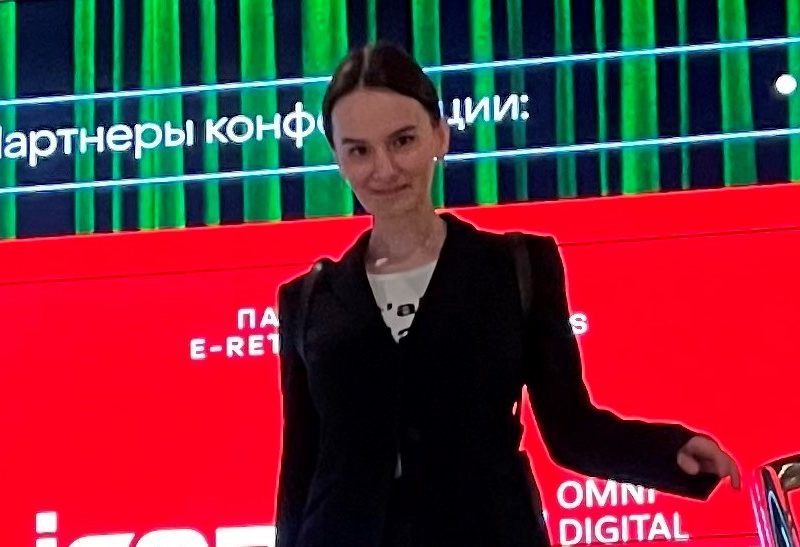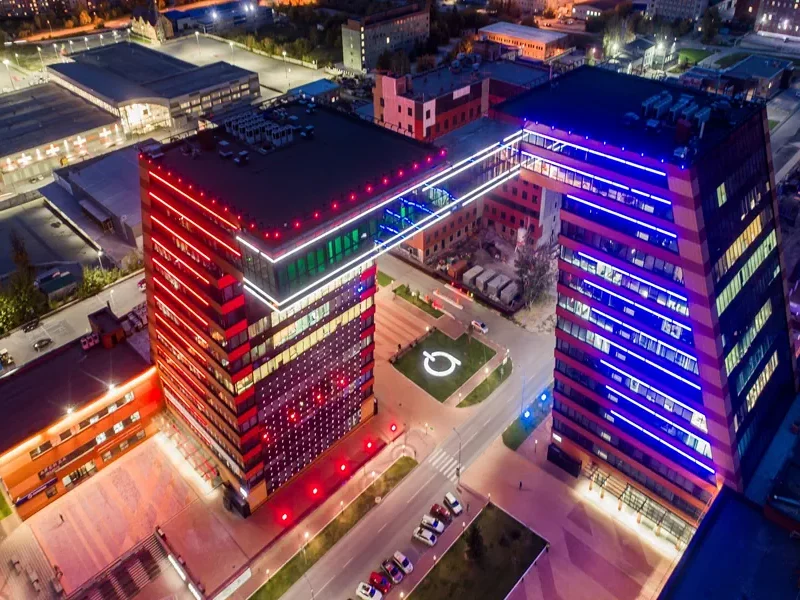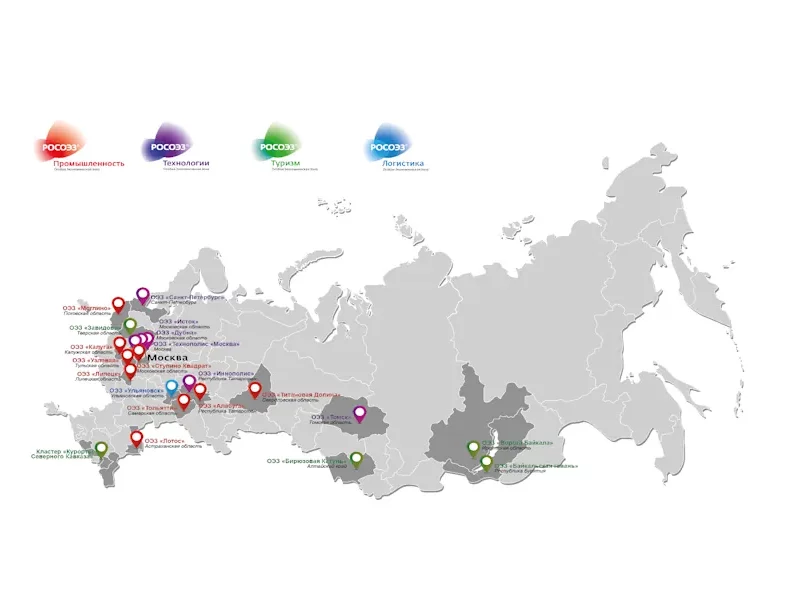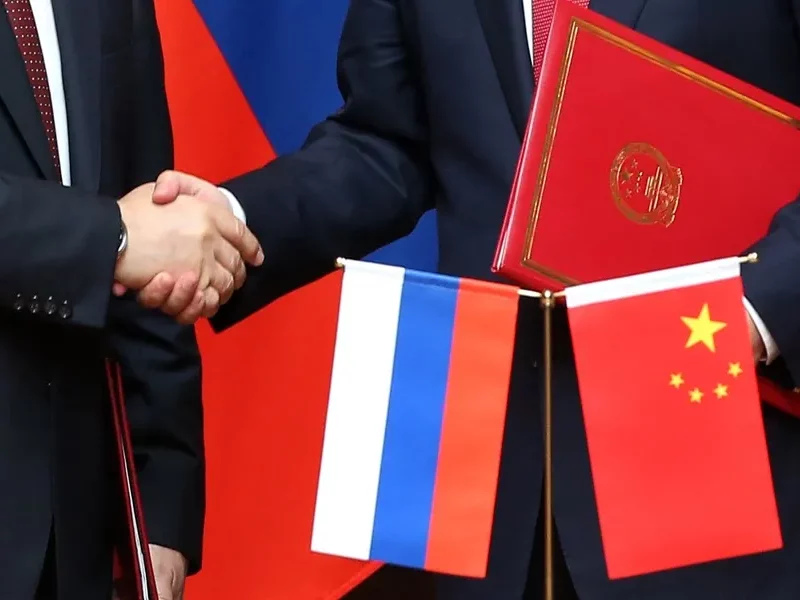If the building has a favorable location, placing a media facade can be one of the most effective ways to use the building. A good location is places with a high passability of people, preferably in the visibility of roads with high traffic and traffic jams. The most profitable cities for placing media facades are Moscow and St. Petersburg.
The article sets out the legal requirements for the placement of the media facade. In particular, the question is considered that if there are several different owners of premises in the building, how should they decide on the use of common property (the outer wall of the building or the roof) to place an advertising structure. To make a decision, two-thirds of the votes of the owners of the premises in the building are required.
The order of placement and installation of advertising structures is regulated by the following acts:
- The Civil Code of the Russian Federation (hereinafter referred to as the Civil Code of Russia)
- Federal Law No. 38-FZ dd. 13.03.2006 “On Advertising” (hereinafter referred to as the Law on Advertising and/or the Federal Law “On Advertising” and/or Law No. 38-FZ).
- Resolution of the Government of Moscow dated 12.12.2012 No. 712-PP (ed. dated 07.12.2021) “On approval of the Rules for installation and operation of advertising structures” (hereinafter referred to as the Rules for installation and operation of advertising structures).
- Resolution of the Government of Moscow No. 713-PP dd. December 12, 2012 “On Approval of Administrative Regulations for the Provision of Public Services by the Department of Mass Media and Advertising of the City of Moscow”. (hereinafter referred to as Resolution No. 713-PP of December 12, 2012)
- Resolution of the Plenum of the Supreme Arbitration Court of the Russian Federation of 23.07.2009 N 64 (hereinafter referred to as Resolution of the Supreme Arbitration Court of the Russian Federation of 23.07.2009 N 64 and/or Resolution of the Supreme Arbitration Court of the Russian Federation N 64)
The procedure for placing advertising structures on a non-residential building
The procedure for installing advertising structures is regulated by Article 19 of the Law on Advertising, as well as by the Decree of the Government of Moscow dated 12.12.2012 N 712-PP (ed. from 07.12.2021) “On approval of the Rules for installation and operation of advertising structures”.
From the analysis of the above norms, it is possible to distinguish two stages of installation of advertising structures:
- conclusion of a contract with the owner of the building on which the installation is planned, for the installation and operation of an advertising structure (paragraph 5 of Article 19 of the Law on Advertising).
- obtaining permission from the local government on the territory of which it is planned to install the structure (paragraph 9 of Article 19 of the Law on Advertising).
Administrative liability is provided for violation of the requirements for installation and (or) operation of an advertising structure (Article 14.37 of the Administrative Code of the Russian Federation).
Also, if one of the owners of the common property in the building is used alone in violation of the law or the procedure for using the common property, he must compensate the other owners for the losses caused (item 27 “Review of judicial practice of the Supreme Court of the Russian Federation No. 1 (2020)” approved by the Presidium of the Supreme Court of the Russian Federation on 10.06.2020).
To place an advertising structure, the owner of the structure or the person who has a proprietary right to the advertising structure or the right to own and use the advertising structure on the basis of an agreement with its owner (hereinafter referred to as – The owner of the advertising structure and/ or the Owner of the structure) must conclude an agreement with the owner of the land plot, building or other immovable property to which the advertising structure is attached. Or rather with a person authorized by the owner of such property, including the tenant, on the basis of which the installation and operation of the advertising structure is carried out (Part 5 of Article 19 of the Law on advertising).
At the same time, by virtue of Part 5.1 of Article 19 of Law No. 38-FZ, the conclusion of a contract for the installation and operation of an advertising structure on a land plot, building or other immovable property owned by the state or municipal property is carried out on the basis of auctions (in the form of an auction or tender) conducted by state authorities, local self-government bodies or authorized they are organizations in accordance with the legislation of the Russian Federation.
Article 247 of the Civil Code of the Russian Federation establishes that the possession and use of property owned in shared ownership are carried out by agreement of all its participants, and if consent is not reached — in accordance with the procedure established by the court.
A participant in shared ownership has the right to provide for his possession and use of a part of the common property commensurate with his share, and if this is not possible, he has the right to demand appropriate compensation from other participants who own and use the property belonging to his share.
At the same time, as follows from the provisions of Article 248 of the Civil Code of the Russian Federation, fruits, products and income from the use of shared property are included in the common property and distributed among the participants of shared ownership in proportion to their shares, unless otherwise provided by an agreement between them.
According to clause 1 of Article 246 of the Civil Code of the Russian Federation, the disposal of property owned in equity is carried out by agreement of all its participants.
The relations of the owners of premises located in a non-residential building arising from common property in such a building are not directly regulated by law, including the law does not establish the procedure for concluding contracts for the installation and operation of advertising structures in non-residential buildings owned by several owners.
Therefore, in accordance with paragraph 1 of Article 6 of the Civil Code of the Russian Federation, the norms of legislation regulating similar relations are subject to application to these relations. The owner of a separate room in a building in all cases owns a share in the right of common ownership of the common property of the building.
Resolution of the Plenum of the Supreme Arbitration Court of the Russian Federation dated 23.07.2009 No. 64 clarifies that “when considering disputes related to the determination of the legal regime of the common property of a building, the premises in which belong to several individuals by right of ownership, the courts must proceed from the following. Regulation of the relations of owners of premises in an apartment building arising from common property is provided for in Articles 289, 290 of the Civil Code of the Russian Federation (hereinafter — the Civil Code of the Russian Federation), Article 36 of the Housing Code of the Russian Federation. In addition, the relations of the owners of premises in any real estate objects that are created in the order of shared construction are directly regulated by Articles 1 and 16 of the Federal Law “On Participation in the Shared Construction of Apartment Buildings and Other Real Estate Objects and on Amendments to Certain Legislative Acts of the Russian Federation”. The relations of the owners of premises located in a non-residential building arising from common property in such a building are not directly regulated by law. Therefore, in accordance with paragraph 1 of Article 6 of the Civil Code of the Russian Federation, the norms of legislation regulating similar relations, in particular Articles 249, 289, 290 of the Civil Code of the Russian Federation, are subject to application to these relations. By virtue of the above, the owner of a separate room in the building in all cases owns a share in the right of common ownership of the common property of the building (paragraph 1. of the Resolution of the Supreme Arbitration Court of the Russian Federation No. 64).”
Also, paragraph 7 of the Resolution of the Supreme Arbitration Court of the Russian Federation No. 64 explains that “by agreement of the co-owners of the common property (owners of premises in the building), the transfer of individual parts of the building for use is allowed. For example, a contract may be concluded for the use of a load-bearing wall or roof of a building for outdoor advertising. All co-owners of the common property of the building, who form a plurality of persons in accordance with the current legislation, are recognized as a party to such an agreement, providing the property for use. A person who uses a part of a building that is not a room under a contract does not own any real estate object and, therefore, has no right to make claims based on Articles 301, 304, 305 of the Civil Code of the Russian Federation. The provisions of the legislation on the lease agreement are applied to such contracts by analogy, and they are subject to state registration in relation to paragraph 2 of Article 651 of the Civil Code of the Russian Federation. In this case, the encumbrance is installed on the entire building as a whole.”
By virtue of paragraph 2 of Article 181.1 of the Civil Code of the Russian Federation, the decision of the meeting, with which the law binds civil consequences, generates legal consequences, to which the decision of the meeting is directed, for all persons who had the right to participate in this meeting (participants of a legal entity, co-owners, creditors in bankruptcy and others — participants of the civil community), as well as for other individuals, if this is established by law or follows from the essence of the relationship.
The decision of the meeting is considered adopted if the majority of the participants of the meeting voted for it, and at the same time at least fifty percent of the total number of participants of the relevant civil society participated in the meeting (paragraph 1 of Article 181.2 of the Code).
In accordance with paragraph 41 of the Resolution of the Plenum of the Supreme Court of the Russian Federation of 23.06.2015 N 25 “On the application by courts of Certain provisions of Section I of Part One of the Civil Code of the Russian Federation” in accordance with paragraph 1 of Article 6 of the Civil Code of the Russian Federation to the relations of owners of premises located in a non-residential building arising from common property in such a building, are subject to application the norms of legislation regulating similar relations, in particular articles 249, 289 and 290 of the Civil Code of the Russian Federation and articles 44-48 of the Housing Code of the Russian Federation.
Issues that fall within the competence of the general meeting of owners of premises in an apartment building are fixed in part 2 of Article 44 of the Housing Code of the Russian Federation.
By virtue of paragraph 4 of Article 45 of the Housing Code of the Russian Federation, the owner, another person specified in the Housing Code of the Russian Federation, on whose initiative the general meeting of owners of premises in an apartment building is convened, are obliged to inform the owners of premises in this house about holding such a meeting no later than ten days before the date of its holding.
Within the specified period, a notice on holding a general meeting of owners of premises in an apartment building must be sent to each owner of the premises in this house by registered mail, unless a decision of the general meeting of owners of premises in this house provides for another way of sending this message in writing, or handed to each owner of the premises in this house under painting or placed in the premises of this house. a house defined by such a decision and accessible to all owners of premises in this house.
In accordance with part 1 of Article 46 of the Housing Code of the Russian Federation, decisions of the general meeting of owners of premises in an apartment building on issues put to the vote are taken by a majority of votes of the total number of votes of owners of premises in an apartment building participating in this meeting, with the exception of decisions provided for in paragraph 1.1 of part 2 of Article 44 of the Housing Code of the Russian Federation, which accepted by more than fifty percent of the votes of the total number of votes of the owners of premises in an apartment building, and provided by the paragraphs 1, 1.1 — 1, 1.2, 2, 3, 3.1, 4.2, 4.3 part 2 of Article 44 of the Housing Code of the Russian Federation of decisions that are taken by a majority of at least two-thirds of the total votes of the owners of premises in an apartment building. According to paragraph 5 of Article 46 of the Housing Code of the Russian Federation, the decision of the general meeting of owners of premises in an apartment building, adopted in accordance with the procedure established by this Code. On issues within the competence of such a meeting, it is mandatory for all owners of premises in an apartment building, including those owners who did not participate in the vote.
Permits for the installation and operation of an advertising structure, according to paragraph 10 of Article 18 of the Law of Moscow dated 20.12.2006 No. 65 (ed. dated 26.12.2018) “On the Government of Moscow”, as well as paragraph 4.2.1 of the Decree of the Government of Moscow dated 22.02.2011 No. 45-PP are issued by the Department of Mass Media and Advertising of the city of Moscow.
The requirements for obtaining a permit for the installation and operation of an advertising structure, in particular for submitting an application and the composition of the necessary documents, are contained in the Law on Advertising, as well as in the Administrative Regulations approved by the Decree of the Government of Moscow of December 12, 2012. No. 713-PP “On approval of Administrative Regulations for the Provision of Public Services by the Department of Mass Media and Advertising of the City of Moscow”, and in the Rules for the Installation and Operation of Advertising Structures (approved by the Decree of the Government of Moscow dated 12.12.2012 N 712-PP (as amended. from 07.12.2021). To obtain a permit, it is necessary to send for consideration the package of documents specified in Chapter 2.5. Appendices 1 to the Decree of the Government of Moscow dated 12.12.2012 No. 713-PP, including to provide information on the payment of the state fee for the issuance of a permit for the installation and operation of an advertising structure in accordance with paragraph 105, paragraph 1, Article 333.33 of the Tax Code of the Russian Federation.
When obtaining permission to place an advertising structure on a non-residential building, it is necessary to take into account the conditions for placing an advertising structure, including those provided for by the Rules for the Installation and Operation of advertising structures: clause 3.1.13. Only one roof advertising structure can be placed on a building, structure or structure, with the exception of placing roof advertising structures on shopping, entertainment centers, cinemas, theaters, circuses, sports facilities.
Разрабатываем Стратегии для собственников бизнеса в целях оптимизации группы компаний, решения нестандартных задач и продажи активов. Оказываем услуги по сопровождению сделок M&A, управлению непрофильными активами и проектами в целом.













